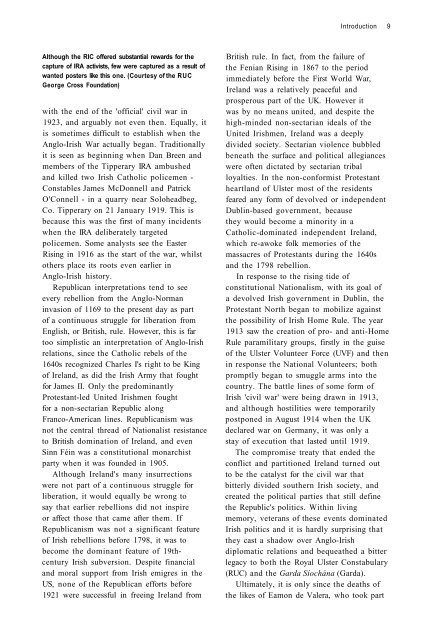You also want an ePaper? Increase the reach of your titles
YUMPU automatically turns print PDFs into web optimized ePapers that Google loves.
Introduction 9<br />
Although the RIC offered substantial rewards for the<br />
capture of IRA activists, few were captured as a result of<br />
wanted posters like this one. (Courtesy of the RUC<br />
George Cross Foundation)<br />
with the end of the 'official' civil war in<br />
1923, and arguably not even then. Equally, it<br />
is sometimes difficult to establish when the<br />
<strong>Anglo</strong>-<strong>Irish</strong> <strong>War</strong> actually began. Traditionally<br />
it is seen as beginning when Dan Breen and<br />
members of the Tipperary IRA ambushed<br />
and killed two <strong>Irish</strong> Catholic policemen -<br />
Constables James McDonnell and Patrick<br />
O'Connell - in a quarry near Soloheadbeg,<br />
Co. Tipperary on 21 January 1919. This is<br />
because this was the first of many incidents<br />
when the IRA deliberately targeted<br />
policemen. Some analysts see the Easter<br />
Rising in 1916 as the start of the war, whilst<br />
others place its roots even earlier in<br />
<strong>Anglo</strong>-<strong>Irish</strong> history.<br />
Republican interpretations tend to see<br />
every rebellion from the <strong>Anglo</strong>-Norman<br />
invasion of 1169 to the present day as part<br />
of a continuous struggle for liberation from<br />
English, or British, rule. However, this is far<br />
too simplistic an interpretation of <strong>Anglo</strong>-<strong>Irish</strong><br />
relations, since the Catholic rebels of the<br />
1640s recognized Charles I's right to be King<br />
of Ireland, as did the <strong>Irish</strong> Army that fought<br />
for James II. Only the predominantly<br />
Protestant-led United <strong>Irish</strong>men fought<br />
for a non-sectarian Republic along<br />
Franco-American lines. Republicanism was<br />
not the central thread of Nationalist resistance<br />
to British domination of Ireland, and even<br />
Sinn Féin was a constitutional monarchist<br />
party when it was founded in 1905.<br />
Although Ireland's many insurrections<br />
were not part of a continuous struggle for<br />
liberation, it would equally be wrong to<br />
say that earlier rebellions did not inspire<br />
or affect those that came after them. If<br />
Republicanism was not a significant feature<br />
of <strong>Irish</strong> rebellions before 1798, it was to<br />
become the dominant feature of 19thcentury<br />
<strong>Irish</strong> subversion. Despite financial<br />
and moral support from <strong>Irish</strong> emigres in the<br />
US, none of the Republican efforts before<br />
1921 were successful in freeing Ireland from<br />
British rule. In fact, from the failure of<br />
the Fenian Rising in 1867 to the period<br />
immediately before the First World <strong>War</strong>,<br />
Ireland was a relatively peaceful and<br />
prosperous part of the UK. However it<br />
was by no means united, and despite the<br />
high-minded non-sectarian ideals of the<br />
United <strong>Irish</strong>men, Ireland was a deeply<br />
divided society. Sectarian violence bubbled<br />
beneath the surface and political allegiances<br />
were often dictated by sectarian tribal<br />
loyalties. In the non-conformist Protestant<br />
heartland of Ulster most of the residents<br />
feared any form of devolved or independent<br />
Dublin-based government, because<br />
they would become a minority in a<br />
Catholic-dominated independent Ireland,<br />
which re-awoke folk memories of the<br />
massacres of Protestants during the 1640s<br />
and the 1798 rebellion.<br />
In response to the rising tide of<br />
constitutional Nationalism, with its goal of<br />
a devolved <strong>Irish</strong> government in Dublin, the<br />
Protestant North began to mobilize against<br />
the possibility of <strong>Irish</strong> Home Rule. <strong>The</strong> year<br />
<strong>1913</strong> saw the creation of pro- and anti-Home<br />
Rule paramilitary groups, firstly in the guise<br />
of the Ulster Volunteer Force (UVF) and then<br />
in response the National Volunteers; both<br />
promptly began to smuggle arms into the<br />
country. <strong>The</strong> battle lines of some form of<br />
<strong>Irish</strong> 'civil war' were being drawn in <strong>1913</strong>,<br />
and although hostilities were temporarily<br />
postponed in August 1914 when the UK<br />
declared war on Germany, it was only a<br />
stay of execution that lasted until 1919.<br />
<strong>The</strong> compromise treaty that ended the<br />
conflict and partitioned Ireland turned out<br />
to be the catalyst for the civil war that<br />
bitterly divided southern <strong>Irish</strong> society, and<br />
created the political parties that still define<br />
the Republic's politics. Within living<br />
memory, veterans of these events dominated<br />
<strong>Irish</strong> politics and it is hardly surprising that<br />
they cast a shadow over <strong>Anglo</strong>-<strong>Irish</strong><br />
diplomatic relations and bequeathed a bitter<br />
legacy to both the Royal Ulster Constabulary<br />
(RUC) and the Garda Síochána (Garda).<br />
Ultimately, it is only since the deaths of<br />
the likes of Eamon de Valera, who took part



